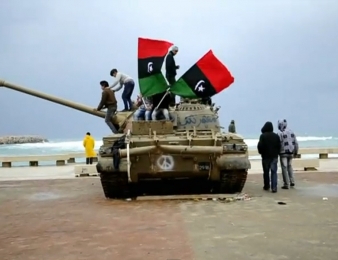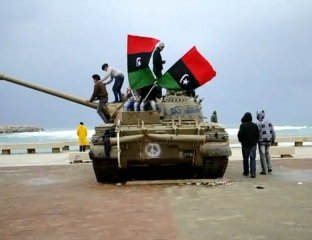UTG Debate – Unearthing the hidden truths between the lines, or…
More puerile crap musing as to why the City Gardens Project will be the greatest thing to hit Aberdeen since the third one went in against Bayern Munich.
Dave Watt and an Italian gentleman muse on some more even-handed, totally neutral articles on the UTG debate from our two august local newspapers, The Depressing Journal and The Evening Suppository.
Col. Gaddafi was a supporter of UTG
A document has been found in a secret box in his Tripoli palace in which Col Gaddafi revealed his support for Union Terrace Gardens. The Colonel’s note admits that he did not want UTG dug up as he had a secret storehouse of Nazi gold which he used to finance the Miners’ Strike in 1983/4 buried under the grass just across from HMT.
– The Depressing Journal 02/02/12
Travellers support unchanged UTG as future camping ground
Joe the gypsy and his family have declared their support for UTG as they intend to have summer camps there for the next ten years. Joe said today,
“UTG is a great camping place and it’s only a short hop from there to the DSS where I and my family can make fraudulent benefit claims by day and roast small babies stolen from Aberdeen citizens over open fires by night”.
– Evening Suppository 22/02/12
Indian and Aussie Tourist Boards worried about City Gardens Project
A spokesman for the Indian Tourist Board in Delhi expressed the Indian government’s worries that the completed City Gardens Project would draw tourists away from the Taj Mahal to the Granite City. Tourism Director Lal Singh said yesterday,
“This is a very worrying development indeed. If this goes ahead it will be the eighth wonder of the world, and who’s going to pay thousands of rupees to visit the Taj Mahal when something concrete built by Stewartie Milne Sahib is on offer.”
The Sydney Bridge’s Press Officer was rather more blunt, however, saying,
“Stone the crows, mate. It’s not bad enough that you whingeing Poms get off stealing our Ashes last year but now you’re going to build something that will make Sydney Harbour Bridge look like the Sheilas’ toilets in Wollamaloo. It’s enough to make a man give up ill-treating Abos and complaining about immigration all day long”.
– The Depressing Journal 22/02/12
Dead rise ruse to praise Gardens raise
Legendary dead Aberdonians have been queuing up at dozens of reliable, scientific and not in the least bit hooky séances across the NE to endorse the City Gardens Project, the ES can exclusively reveal. Local medium, the mysterious, yet oddly familiar, Madame Ina Wood has found that local spooks are unanimous in their support for the cement vanity project. She said that famous Japanese, Kung Fu mannie Thomas Glover explained to her,
“I’m Thomas Glover and I’m dead now, but I look forward to my eternal spirit flitting hither and thither like a divine zephyr around the concrete gardens that will totally put Aberdeen on the map as it wasn’t on one before apparently.”
Long dead architect Scott Sutherland said,
“Jings I wish I’d built something half as good as the City Gardens Project. It’s going to look wonderful, and not at all be a hideous concrete abortion. I can’t wait to tell Bernini and Frank Lloyd Wright all about it at our next Jenga evening.”
Early photographer George Washington Wilson added,
“I took photos of Union Terrace in the nineteenth century and I only wish these hideous gardens had never existed. If there had been nothing there to photograph, I may have been able to follow my original dream of taking lots of photos of naked ladies for bongo mags. My spirit shall haunt the development like a bad smell.”
Madame Ina Wood told the ES,
“Cross my palm with silver dearie – about £50m should do – the spirits don’t lie. This is all absolutely true, and not a pile of hooey designed to fool the gullible. I’ll stake my hoop earrings and bizarre sideburns on it”.
– Evening Suppository 23/02/12
Nostradamus predicted City Gardens Project
A recent study revealed that the seer Nostradamus predicted the rise of the City Gardens Project in Les Prophecies (1555) where he stated,
“A mighty stone mountain shall arise in the north like a phoenix from a deep valley frequented by ne’er-do-wells and assorted rascals in a city made of granite. The rising of this stone shall herald a Golden Age for the city. Poverty and want shall be a thing of the past and by God and Sweet Sunny Jesus, will those jammy Jock bastards be coining it in? I should f**king say so. Shekels galore, more funny black stuff than you can shake a stick at and four straight European Cup wins for the local calcio team added to a seventeen-nil home win over some recently impoverished followers of William of Orange. Go for it, you hairy kneed Caledonian caber tossers”.
– The Depressing Journal 23/02/12
City Gardens Project means absolutely phenomenal number of jobs and money for everybody
A recent study by the totally neutral Vote For The City Gardens Or We’ll Come Round To Your House, Rape Your Dog And Scatter Your Garbage Group has discovered that the City Gardens Project will actually generate jobs for around nine billion people. A spokesperson for the group told us that there was a slightly worrying shortfall with less than eight billion people on the planet at present but it was hoped that some sort of shift system might be introduced allowing people to breed during working hours.
The same study showed that the knock-on effect of this huge project would encourage tourists from all over the Solar System to visit Aberdeen with many hotels in the Granite City receiving bookings from Mars, Venus and Mercury already. With this increase in tourism plus the work situation the group also estimated that each household in Aberdeen would be £17m better off once the Project was completed.
– The Depressing Journal 24/02/12
Pro-UTG groups to establish labour camps for opponents
Reports have reached the Evening Suppository that supporters of the City Gardens Project have been subjected to threats and intimidation by shadowy figures in trenchcoats at three in the morning brandishing voting forms.
Speaking in stock ludicrous 1960’s movie German accents they have announced:
“Zat for you, Scottische schweinhund, ze Union Terrace Gartens debate is ofer” and “Ve haf vays of making you vote nein”.
If their demands have not been immediately agreed to by the unfortunate victims they have been threatened further,
“Perhaps your family und household pets vould benefit from ein kleine holiday in ‘ze camps’”.
– Evening Suppository 24/02/12



